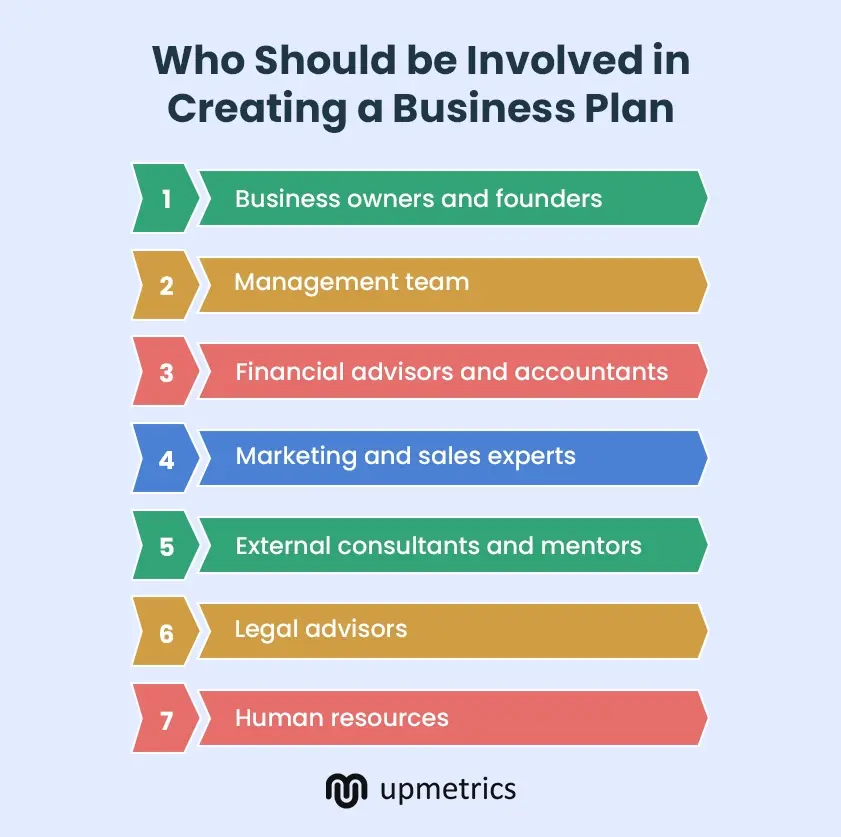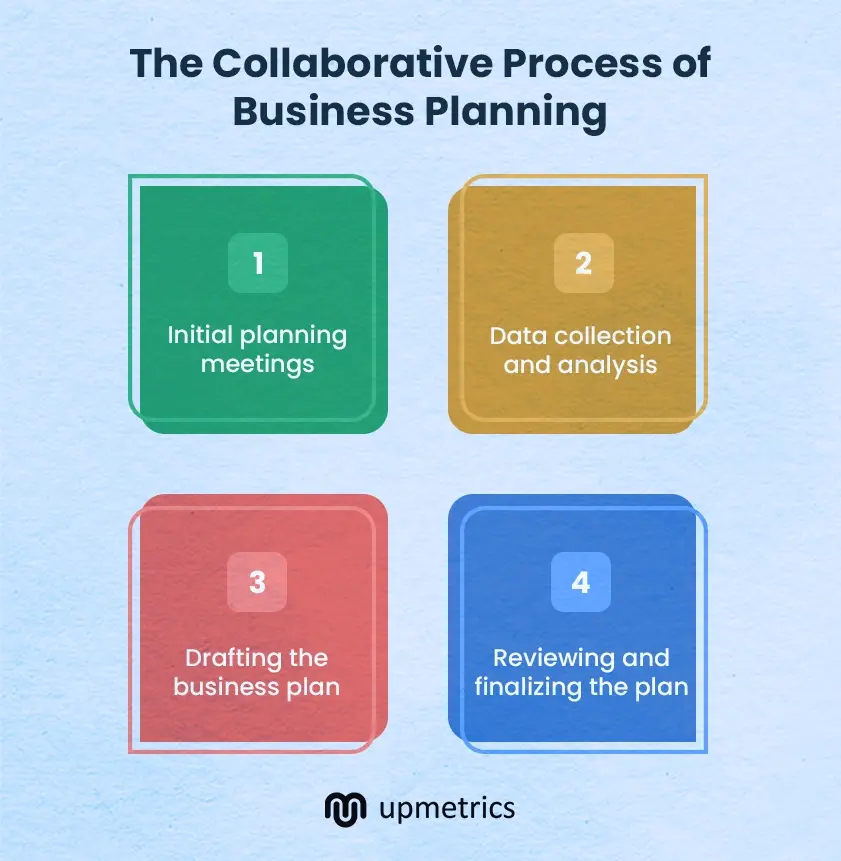A successful business plan addresses all the aspects of business planning comprehensively and realistically.
However, writing it single-handedly without any help can result in a superficial document that fails to address crucial details.
Whether it’s structuring, strategizing, financing, or designing an implementation approach—one needs the opinions and inputs of different experts to add depth and value to the business plan.
Involving the right people can enhance the quality and usefulness of your business plans significantly. But the question is who should be involved in creating a business plan?
Let’s decode that in this blog post. But before that…
Key Takeaways
- Developing a business plan should be a collaborative effort involving founders, key team members, and relevant stakeholders.
- Involving diverse perspectives ensures a more comprehensive and realistic plan.
- Engagement from those responsible for implementation fosters ownership and alignment with the plan’s objectives.
Why involve multiple people in creating a business plan?
Involving different people in your planning process helps you prepare a feasible, actionable, and well-rounded business plan addressing key components of your business plan efficiently.
Here are a few more benefits of having multiple people on your plan writing team:
- Offers you a comprehensive perspective of every department.
- Aligns your long-term objectives with individual departmental goals.
- Identifies the risks, loopholes, and opportunities that would’ve skipped individual attention.
- Enhances commitment and ownership towards the business goals.
- Provides realistic projections and financials to secure funding.
- Increases the relevance and efficiency of your strategies.
All in all, when you get multiple people on your business planning team, you get to explore the depth and breadth of different business aspects helping you build an actionable plan.
Who should be involved in creating a business plan

Here are a few stakeholders, professionals, and subject matter experts whose contribution to a business plan can make a significant difference.
1. Business owners and founders
There’s no doubt that the founding members of a business should lead the plan writing process. After all, no one can translate the concept, vision, and long-term objectives of a business better than them.
The entrepreneurs and people in the senior position add strategic value to your plan. They bring their expertise and nuanced market understanding to the table and contribute significantly to setting the overall direction of the company.
Apart from strategy development, owners can also contribute to aspects such as financial planning, resource allocation, compliance, operations, and market analysis.
2. Management team
Involving a management team and departmental heads in the plan writing process can help devise feasible and attainable departmental goals. They can offer valuable insights about the internal processes and can help in designing a realistic implementation approach.
3. Financial advisors and accountants
The backbone of any business plan is the accuracy of its financial projections. This is exactly what the financial advisors and experts will help you with.
A financial expert can make realistic projections for different financial aspects (revenue, sales, cash flow) and can help evaluate the financial sustainability and viability of your business idea.
Additionally, inputs from the financial team can assist decision-makers in making significant strategic decisions. For instance, whether to start with a new product line, open a business in a new state, or hire an in-house developer team.
4. Marketing and sales experts
Marketing and sales professionals can help you devise optimum strategies for attracting your target consumers and converting them into sales.
These people are subject matter experts when it comes to understanding market trends, target markets, competition, and consumer behavior. With their assistance, you can create a feasible marketing and sales plan and assign responsibilities to suitable team members.
5. External consultants and mentors
Hiring business plan consultants and subject matter experts from the external environment can help your business plan in multiple ways.
Firstly, these experts offer an unbiased perspective and fresh thought processes for your business plan. Their expertise can help you understand market trends, competition, product development, operations, and overall business management in a better light.
Additionally, these experts bring the expertise of working with multiple businesses. They help identify and address the pitfalls and opportunities that remained unrecognized earlier.
Lastly, involving external people can build support and buy-in for your business plan. Their support can build credibility and win the stakeholder’s confidence in your idea.
6. Legal advisors
Legal advisors can help ensure that your business complies with all the essential rules and governance applicable to your business.
Getting them on board with your business plan will help you get invaluable advice about business structuring, contract management, and the protection of intellectual property.
7. Human resources
HR teams can also contribute to writing your business plan. These experts can help in designing your hiring plans and setting up a company culture.
Since they are the ones directly in contact with the employees, it’s important to take their opinions and insights on hiring, training, and retention strategies.
Remember, it’s your team that will turn your ideas into a success. So anything that makes them productive, happy, and motivated should be given serious thought while designing your business plan.
That’s it. Now, identify which of these stakeholders and professionals from the above list can assist you in writing a business plan and get their help to prepare a comprehensive roadmap.
The collaborative process of business planning

Business planning is a collaborative process that takes your business idea and tries to turn it into a success. Follow this step-by-step process to meet your end goal of creating an actionable business plan.
1. Initial planning meetings
The initial stages of business planning focus on building a solid foundation for your business ideas. It brings together all the stakeholders and instills clarity about the following core aspects:
- The mission, vision, and long-term objective of your business.
- The products and services you will offer.
- Key milestones and overall business strategy.
When everyone has a clear understanding of what the business does and what it aims to achieve, it’s easier to set the direction of your plan.
2. Data collection and analysis
After setting the initial direction, collect and analyze the data thoroughly to help you with strategy development.
Assign people to gather data for the target market, competitors, and financials and analyze the raw data to get the following answers:
- Target audience details
- Market share of your product
- Competitive advantage of your firm
- Marketing strategies that can attract potential customers
- Employee requirements for different business functions
- Gaps in the current market offerings
- Startup costs to kickstart your business
- Revenue projections for the next few years
- Profitability
- Break-even point of your business and much more.
These answers are essential to help you write a comprehensive business plan.
3. Drafting the business plan
Now that you have all the information essential for a business plan, you can start writing one business plan.
Depending on your purpose and needs, you can write a traditional detailed or quick lean plan. However, make sure you include the following business plan components to make it meaty.
- Executive summary
- Company overview
- Target market analysis
- Competitors analysis
- Products and services
- Operations plan
- Marketing and sales strategies
- Key management team
- Financial plan
- Appendix
Now structuring information within each of these components is equally essential. And no it’s not that difficult.
How? Using a business plan template or a business planning tool can make writing your business plan much easier and more efficient.
Say goodbye to boring templates
Build your business plan faster and easier with AI
Plans starting from $14/month

4. Reviewing and finalizing the plan
Reviewing your business plan after writing it can help identify loopholes, errors, and unaligned context.
So whether you use it for internal or external purposes—review it thoroughly before putting it to use.
To make your review process more fruitful; bring legal experts, financial advisors, and prominent stakeholders on board. Ask them to review your plan and use their feedback and input to strengthen your plan.
You can now use your final plan to attract investors, communicate with an internal team, streamline your operations, or guide you with a roadmap.
Conclusion
A business plan is a crucial document that guides your business toward success. By involving different stakeholders and managerial heads in this process, you can make your business plan more thorough and insightful.
So why the wait? Quickly determine who could help you write a business plan and get them on board. However, instead of writing your plan from scratch, consider using a tool that can help you write faster and more structurally. Something like the Upmetrics business planning app.
With Upmetrics, you get access to 400+ business plan samples and an AI business plan generator that will help you create well-rounded business plans in no time.

